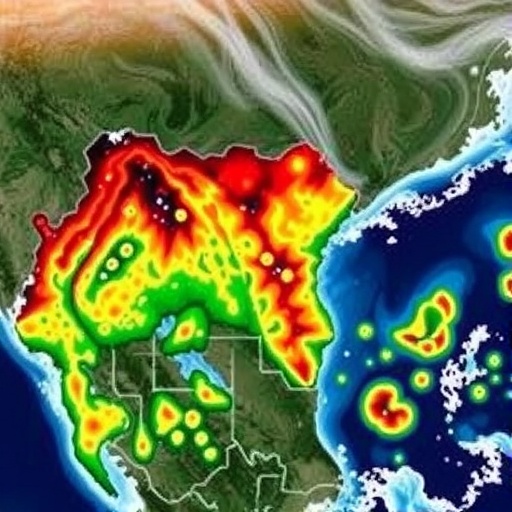The catastrophic decline of tropical rainforests in southwest Nigeria presents an urgent call to action, as the repercussions are felt not only locally but also on a global scale. In a revealing study conducted by Oloyede, Okimiji, and Oloketuyi, the researchers dive deep into the environmental temperature crises triggered by widespread deforestation. They meticulously document how the loss of this precious ecosystem contributes to rising temperatures, which can lead to catastrophic climatic conditions not only for the immediate region but for the entire planet. As humanity grapples with climate change, understanding the implications of such actions is more crucial than ever.
Tropical rainforests, known as the lungs of our planet, play a critical role in absorbing carbon dioxide and producing oxygen. However, in southwest Nigeria, advancements in agriculture and urbanization are leading to unprecedented levels of deforestation. This destruction is primarily driven by the need for land to accommodate agricultural practices and urban expansion. The study highlights how these practices destabilize the delicate balance of ecosystems, which is critical for regulating local temperatures and rainfall patterns. The ramifications are severe, as trees are not just resources; they are integral to maintaining environmental equilibrium.
As trees are removed, the impact on soil and local climates cannot be understated. The loss of canopy cover exposes the ground to direct sunlight, subsequently raising surface temperatures. This alteration in local climate can lead to a series of chain reactions, resulting in altered weather patterns, reduced rainfall, and an increased likelihood of drought. Areas that were once teeming with biodiversity face a stark transition into arid landscapes, which poses a significant threat to both flora and fauna that depend on these environments for survival. Thus, the study underscores not only the environmental implications but also the broader biological consequences of deforestation.
Furthermore, the researchers elucidate the role of deforestation in exacerbating global warming. As the forests vanish, the stored carbon within the trees is release into the atmosphere, significantly increasing greenhouse gas concentrations. The findings suggest that the local impact of deforestation can have global repercussions. The study finds that the mass removal of trees contributes to a feedback loop, where rising temperatures lead to decreased rainfall, which in turn creates conditions that make it more difficult for remaining vegetation to thrive. This cycle intensifies the urgency of reversing current deforestation practices.
The environmental temperature crisis exacerbated by widespread deforestation in southwest Nigeria calls for an immediate reassessment of land management practices. The authors recommend that stakeholders implement strategies that preserve existing rainforests, including policies aimed at sustainable agriculture and urban planning. Investments in education and community awareness initiatives are equally important, empowering local residents to understand the critical value of their natural resources. Bringing these communities into conversations about sustainable practices may promote a culture that values ecological balance.
Complementary to these community-driven actions, governmental involvement is crucial. The study suggests that stricter enforcement of environmental laws and regulations could curb illegal logging and land clearing. The researchers advocate for increased funding for conservation initiatives and reforestation programs, which would not only combat the immediate effects of deforestation but also contribute to long-term environmental health. The authors emphasize that restoring these ecosystems is not merely an ecological endeavor but essential for public health and economic stability.
To further illustrate the scope of the destruction and its effects, Oloyede and his colleagues present compelling data visualizations, showcasing temperature variations and forest cover loss over time. These charts provide persuasive evidence of the correlation between deforestation rates and local temperature increases. Through this meticulous examination, the study demonstrates how temperatures have spiked alarmingly in recent years, which could lead to health crises as places once known for moderate climates begin to resemble more extreme environments.
The implications of this research extend beyond environmentalists and policymakers; they resonate with everyone who interacts with the environment. As consumers, individuals far removed from these forests play a role in this crisis through the products they choose and the agricultural practices they support. Thus, consumer awareness and education can drive demand for sustainably sourced products, fostering a marketplace that values the preservation of our natural resources.
By weaving together data, local experiences, and actionable solutions, the study presents a holistic view of the deforestation crisis in southwest Nigeria. It underscores a vital truth: the fight against climate change, and its associated temperature increases, is a collective responsibility that requires participation from all sectors of society. The authors end with a poignant reminder that while economic development is essential, it should not come at the expense of the environment.
In conclusion, the importance of this research cannot be overstated. The laneways of deforestation in southwest Nigeria serve as a stark reminder of the interconnectedness of climate systems globally. The authors call for immediate changes in policy, education, and individual behavior in order to mitigate the devastating effects of temperature rise due to deforestation. By taking proactive steps now, it’s possible to preserve vital ecosystems for future generations while creating a healthier planet.
Through this exploration, Oloyede, Okimiji, and Oloketuyi have painted a vivid picture of both the challenges ahead and the paths that can lead to sustainable solutions. In the ongoing narrative of climate change, their work stands as a critical voice urging us all to recognize our role in this global crisis.
Subject of Research: Deforestation and its effects on environmental temperature in southwest Nigeria.
Article Title: Massive destruction of tropical rain forest and its soaring effect on environmental temperature in south west Nigeria.
Article References:
Oloyede, J.O., Okimiji, O.P. & Oloketuyi, A.J. Massive destruction of tropical rain forest and its soaring effect on environmental temperature in south west Nigeria.
Discov glob soc 3, 110 (2025). https://doi.org/10.1007/s44282-025-00196-3
Image Credits: AI Generated
DOI: https://doi.org/10.1007/s44282-025-00196-3
Keywords: Deforestation, environmental temperature, climate change, tropical rainforest, southwest Nigeria, ecosystem, carbon dioxide, sustainable practices.




